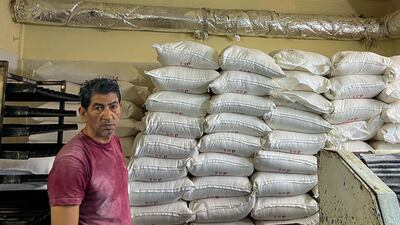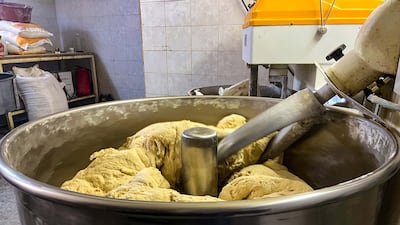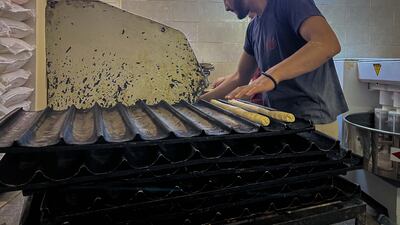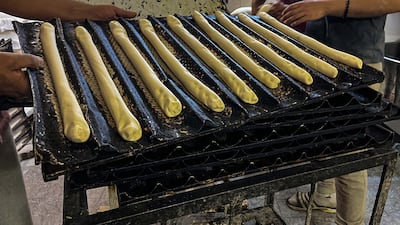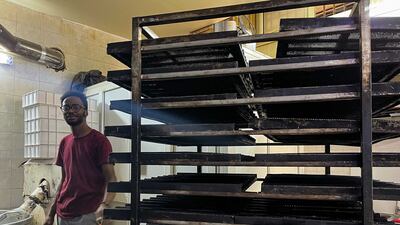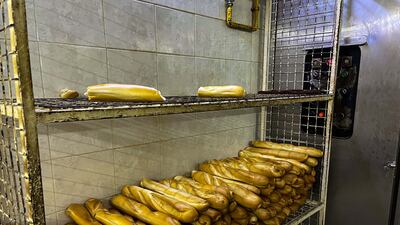For husband and wife Chokri and Saadia, the fear their four young children will wake up crying for food lingers as Tunisia undergoes another shortage of wheat products including semolina and flour.
It has been six months since the couple built a tiny shop selling mlawi – a thin flatbread made of very fine semolina – outside their home in a popular neighbourhood on the outskirts of El Aouina suburb in Tunis.
“We barely managed to get two 10kg semolina bags yesterday," Chokri told The National from behind the counter of his shop.
"They [the provider] refused to give us more, not only because of the shortage, but also because we do not have a business licence yet.”
Chokri said the lack of licence was not a problem when semolina was widely stocked but now there is a shortage providers are under pressure and they need to abide by the law due to government scrutiny.
“You have no idea the time and effort I need to put in order to turn the semolina we got to a fine one that we could use to work,” Saadia said, showing blisters on her hand caused by kneading bread for an entire day.
Their job became harder as they were only able to get their hands on thick semolina, which is not easy to work with when making mlawi.
“A friend of mine told me that he had to resort to soaking couscous in water overnight and adding the small amount of semolina they got in the morning to keep his business going,” Chokri said.

Tunisian President Kais Saied on Monday accused certain “known parties”, which he did not identify, of provoking a bread shortage crisis in the country.
He urged officials to find a speedy solution to the issue for fear of a domino effect on other products.
“Honestly, if the President cannot find a solution to the situation, who else is supposed to?” Saadia said.
“They [officials] need to understand that the citizen is their responsibility … we are tired of their empty words.”
Regular bakery owners share the same concerns.
“There is certainly a delay in providing us with what we need,” Kais Menejja, owner of a bakery in the Taeib Mhiri neighbourhood in El Aouina, told The National.
Mr Menejja said despite attempts to use the designated quota he receives from the Tunisian cereal office evenly, working conditions became stressful due to the continuing shortage.
Businesses at risk of closure
Ridha Touil, who owns bakeries in El Aouina and Ben Arous, told The National one of his bakeries would shut down within two days because of the lack of reserves.
“I know at least three bakeries that have already closed down since they ran out of flour," he said. "That creates pressure on the ones that are still working, leading them to close as well."
He said he notified the Ministry of Commerce that his business could close within a day or two but no solution was provided.
Minister of Commerce Kalthoum Ben Rjeb this week said semolina was available after the importation of vital quantities of durum wheat.
She said last week's dearth was now resolved.
However, finding bread remains an ordeal, many citizens say.
“There is no way you could find bread after 3pm,” Saliha, 53, told The National outside a bakery in Taeib Mhiri.
“It’s frustrating. What are families supposed to do? They [the state] have kept increasing prices and now we keep having back-to-back shortages,” she added.
“It is as if they are taking turns, whoever leaves makes sure that his successor does the same.”
For months, Tunisians have suffered from shortages of foodstuffs such as sugar, cooking oil, coffee, milk and butter.
Cereal-based products disappear more often because of the disruption to the global market caused by the conflict in Ukraine.
The shortages, which have affected subsidised products, are more visible because of a crisis in public finances, which stalled Tunisia’s food import payments, leading to a dearth of many products in local shops and markets.
The Tunisian government continues to seek a bailout from the International Monetary Fund to alleviate the economic crisis.
